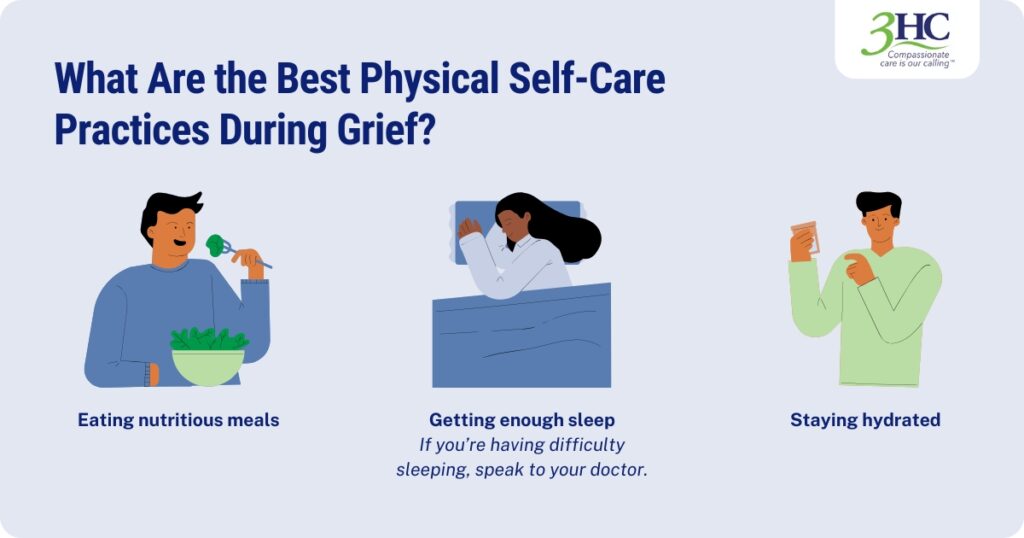More Than Emotions: We Examine the Physical Effects of Grief
Grief comes in many forms, and there is no “right” way to grieve. When speaking about grief, many consider the tears, crying spells, and depression that often follow.
But what about a headache or an upset stomach?
These are some of the lesser-known physical effects of grief. The process of grieving isn’t just difficult on you psychologically—it affects you physically as well.
“At 3HC, we empathize with what our patients’ families and loved ones are going through, and we want them to know that our grief care professionals are always here to help them,” said Edith Keesecker, 3HC Bereavement Experience Coordinator. “If you believe you are having some of the physical manifestations of grief, we urge you to schedule an appointment with your healthcare provider.”
How Does Grief Affect the Body?
It’s important to note that not only can grief cause physical symptoms, but it can make your current health issues worse. For example, if you already have high blood pressure, the stress of grief can make it even worse. Grief can cause extreme fatigue, digestive problems, and even headaches.
We’ll take a look at some of the most common physical effects of grief and what you can do to help both your mind and your body.
The 6 Most Common Physical Effects of Grief
Dealing with major life changes–such as the loss of a loved one–is stressful, and over time, that stress can manifest itself in some of the following physical symptoms:
1. Fatigue/Exhaustion
There’s a term for this: It’s called emotional exhaustion, and it can be caused not just by the death of someone you love, but when you’ve had long-term exposure to a variety of stressors, whether that is caring for a family member, financial stress, or experiencing a chronic illness.
The emotional exhaustion associated with grief makes it difficult to complete daily tasks and honor workplace commitments.
2. Insomnia
Difficulty falling asleep or staying asleep are other classic physical effects of grief. Whether you’re envisioning memories of your loved one or are overwhelmed by stress, sleeplessness carries a heavy toll on you both emotionally and physically.
3. Digestive Problems
Are you experiencing nausea or an upset stomach? Grief has a direct effect on the stomach. In fact, your gut has the highest concentration of nerves outside your brain. Stress inhibits the digestive process. In extreme cases, this may result in irritable bowel syndrome or ulcers.
4. Headaches
Headaches and occasional dizziness can result from grief and long-term exposure to stressful situations.
5. Cardiac Symptoms
While some may experience chest pains and a racing heartbeat as the result of ongoing grief, we want to emphasize that chest pains could also indicate a medical emergency.
If you have chest pain or you believe you are having a heart attack, call 9-1-1. Don’t try to diagnose yourself—you need prompt evaluation by a doctor. Don’t take chances when it comes to your health and well-being.
6. Weakened Immune System
Don’t be surprised if you get sick more often than usual. Grief can weaken your immune system, especially if your health is already compromised by an autoimmune disease such as rheumatoid arthritis.
Does Grief Cause Physical Pain?
Yes, it certainly can. We outlined a few of these issues above, indicating that grief can cause everything from extensive headaches to painful ulcers.
Any physical symptoms you are having should be evaluated by your doctor or another healthcare professional.
Does Exercise Help With Grief?
Yes, it can. In fact, you’ll discover that many aspects of maintaining a healthy lifestyle can provide relief. Some of these include:

Many have also found that experiencing nature, whether it’s a hike or just a brief excursion to the local park, can help.
Take Advantage of Our Grief Care Services at 3HC
We believe you are a part of our family, and we want to be with you throughout your grieving process.
Our Bereavement Care team is composed of specially trained professionals who will help you discover healthy ways to cope with and process your grief. We provide these services for 13 months after the death of your loved one. We also have monthly support groups to help you along your journey.
We invite you to contact us to learn more.
The content within this article and others on this website is only for educational purposes and should not be considered as medical advice. For any questions or concerns, please consult with your healthcare provider.
=============
Sources:
Brigham Young University, “Stress and the Digestive System” https://caps.byu.edu/stress-and-the-digestive-system
The Cleveland Clinic, “What To Do When You’re (Literally) Sick With Grief” https://health.clevelandclinic.org/can-grief-make-you-sick
The Mayo Clinic, “Mayo Clinic Q and A: Emotional Exhaustion: When Your Feelings Feel Overwhelming” https://newsnetwork.mayoclinic.org/discussion/mayo-clinic-q-and-a-emotional-exhaustion-when-your-feelings-feel-overwhelming





